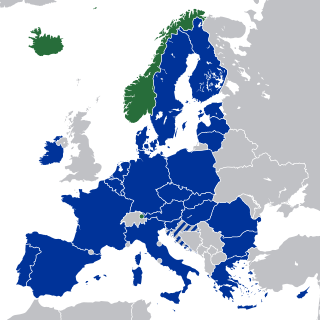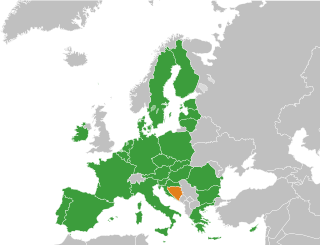
The Council of the European Union, often referred to in the treaties and other official documents simply as the Council, and informally known as the Council of Ministers, is the third of the seven Institutions of the European Union (EU) as listed in the Treaty on European Union. It is one of two legislative bodies and together with the European Parliament serves to amend and approve or veto the proposals of the European Commission, which holds the right of initiative.

The European Union (EU) is a supranational political and economic union of 27 member states that are located primarily in Europe. The Union has a total area of 4,233,255 km2 (1,634,469 sq mi) and an estimated total population of over 448 million. The EU has often been described as a sui generis political entity combining the characteristics of both a federation and a confederation.

The European Economic Community (EEC) was a regional organisation created by the Treaty of Rome of 1957, aiming to foster economic integration among its member states. It was subsequently renamed the European Community (EC) upon becoming integrated into the first pillar of the newly formed European Union in 1993. In the popular language, however, the singular European Community was sometimes inaccurately used in the wider sense of the plural European Communities, in spite of the latter designation covering all the three constituent entities of the first pillar.

The European Commission (EC) is part of the executive of the European Union (EU). It operates as a cabinet government, with 27 members of the Commission headed by a President. It includes an administrative body of about 32,000 European civil servants. The commission is divided into departments known as Directorates-General (DGs) that can be likened to departments or ministries each headed by a Director-General who is responsible to a Commissioner.

The president of the European Commission is the head of the European Commission, the executive branch of the European Union (EU). The president of the Commission leads a cabinet of Commissioners, referred to as the College. The president is empowered to allocate portfolios among, reshuffle, or dismiss Commissioners as necessary. The College directs the commission's civil service, sets the policy agenda and determines the legislative proposals it produces. The commission is the only body that can propose or draft bills to become EU laws.

The European Economic Area (EEA) was established via the Agreement on the European Economic Area, an international agreement which enables the extension of the European Union's single market to member states of the European Free Trade Association. The EEA links the EU member states and three of the four EFTA states into an internal market governed by the same basic rules. These rules aim to enable free movement of persons, goods, services, and capital within the European single market, including the freedom to choose residence in any country within this area. The EEA was established on 1 January 1994 upon entry into force of the EEA Agreement. The contracting parties are the EU, its member states, and Iceland, Liechtenstein, and Norway. New members of EFTA would not automatically become party to the EEA Agreement, as each EFTA State decides on its own whether it applies to be party to the EEA Agreement or not. According to Article 128 of the EEA Agreement, "any European State becoming a member of the Community shall, and the Swiss Confederation or any European State becoming a member of EFTA may, apply to become a party to this Agreement. It shall address its application to the EEA Council." EFTA does not envisage political integration. It does not issue legislation, nor does it establish a customs union. Schengen is not a part of the EEA Agreement. However, all of the four EFTA States participate in Schengen and Dublin through bilateral agreements. They all apply the provisions of the relevant Acquis.

The European Atomic Energy Community is an international organisation established by the Euratom Treaty on 25 March 1957 with the original purpose of creating a specialist market for nuclear power in Europe, by developing nuclear energy and distributing it to its member states while selling the surplus to non-member states. However, over the years its scope has been considerably increased to cover a large variety of areas associated with nuclear power and ionising radiation as diverse as safeguarding of nuclear materials, radiation protection and construction of the International Fusion Reactor ITER.

The European Court of Auditors is the supreme audit institution of the European Union (EU). It was established in 1975 in Luxembourg and is one of the seven EU institutions. The Court comprises one member from each EU member state supported by approximately 800 civil servants.

The European Communities (EC) were three international organizations that were governed by the same set of institutions. These were the European Coal and Steel Community (ECSC), the European Atomic Energy Community, and the European Economic Community (EEC), the last of which was renamed the European Community (EC) in 1993 by the Maastricht Treaty establishing the European Union. The European Union was established at that time more as a concept rather than an entity, while the Communities remained the actual subjects of international law impersonating the rather abstract Union, becoming at the same time its first pillar. In the popular language, however, the singular European Community was sometimes inaccurately used interchangeably with the plural phrase, in the sense of referring to all three entities.

The European Union Aviation Safety Agency (EASA) is an agency of the European Commission with responsibility for civil aviation safety in the European Union. It carries out certification, regulation and standardisation and also performs investigation and monitoring. It collects and analyses safety data, drafts and advises on safety legislation and co-ordinates with similar organisations in other parts of the world.

The institutions of the European Union are the seven principal decision-making bodies of the European Union and the Euratom. They are, as listed in Article 13 of the Treaty on European Union:
The Framework Programmes for Research and Technological Development, also called Framework Programmes or abbreviated FP1 to FP9, are funding programmes created by the European Union/European Commission to support and foster research in the European Research Area (ERA). Starting in 2014, the funding programmes were named Horizon.

The European Union and Georgia have maintained relations since 1992, following an agreement between the former European Community and the newly independent Georgia. In 2006, a five-year "Action Plan" of rapprochement was implemented in the context of the European Neighbourhood Policy (ENP). In 2009, relations between the two were further upgraded under the auspices of Eastern Partnership. In 2016, a comprehensive Association Agreement between the EU and Georgia went into force, providing Georgian citizens with visa-free travel to the EU, as well as access to some sectors of the European Single Market. Following Brexit, most of the existing EU-Georgia agreements applicable to the United Kingdom were renegotiated and agreed upon in 2019 bilaterally with the United Kingdom.

Albania is on the current agenda for future enlargement of the European Union (EU). It applied for EU membership on 28 April 2009, and has since June 2014 been an official candidate for accession. The Council of the European Union decided in March 2020 to open accession negotiations with Albania.

The accession of Bosnia and Herzegovina to the European Union (EU) is the stated aim of the present relations between the two entities. Bosnia and Herzegovina has been recognised by the European Union as a "candidate country" for accession since the decision of the European Council in 2022 and is on the current agenda for future enlargement of the EU. Bosnia and Herzegovina takes part in the Stabilisation and Association Process and trade relations are regulated by an Interim Agreement.
European Union (EU) concepts, acronyms, and jargon are a terminology set that has developed as a form of shorthand, to quickly express a (formal) EU process, an (informal) institutional working practice, or an EU body, function or decision, and which is commonly understood among EU officials or external people who regularly deal with EU institutions.

The area of freedom, security and justice (AFSJ) of the European Union (EU) is a policy domain concerning home affairs and migration, justice as well as fundamental rights, developed to address the challenges posed to internal security by collateral effects of the free movement of people and goods in the absence of border controls or customs inspection throughout the Schengen Area, as well as to safeguard adherence to the common European values through ensuring that the fundamental rights of people are respected across the EU.

On 28 February 2022, four days after it was invaded by Russia, Ukraine applied for membership of the European Union (EU). Ukrainian President Volodymyr Zelenskyy requested immediate admission under a "new special procedure", and the presidents of eight EU states called for an accelerated accession process. European Commission president Ursula von der Leyen stated that she supports Ukrainian accession, but that the process would take time. On 10 March 2022, the Council of the European Union asked the commission for its opinion on the application. On 8 April 2022, von der Leyen presented Zelenskyy with a legislative questionnaire, which Ukraine responded to on 9 May.

The main bodies of the European Union and the Euratom are:
The order of precedence of the European Union is the protocol hierarchy in which its offices and dignitaries are listed according to their rank in the European Union. Article 13 of the Treaty on European Union, entered into force on 1 December 2009, sets the EU's current order of precedence among the EU institutions and bodies. The EU administrative structure further has interinstitutional services, decentralised organisations (agencies), executive agencies, Euratom agencies and bodies, and other EU organisations not included in the order of precedence.
















